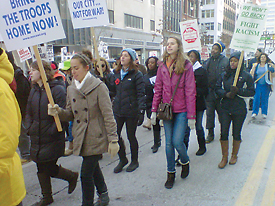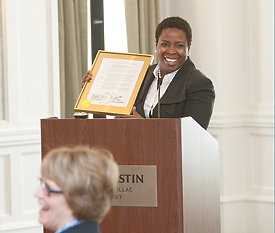Related stories:
Longtime Detroit partnership strives to improve health of residents >
U-M students learn, engage through Semester in Detroit
Patrick Morris, whose family’s deep ties in Michigan contributed to his desire to stay in the state after graduation, has been establishing roots in Detroit.
Morris, a 23-year-old from Hartland, participated in the Semester in Detroit program, which allows U-M undergraduates to spend a semester living in, learning from and exploring the city.
Last year, he interned in a program that placed professional writers in the Detroit Public Schools to inspire students through creative writing.
“Semester in Detroit made me not a Detroiter, but a Michigander,” says Morris, who now works at Racquet Up Detroit, an after-school program designed to improve the lives of youth through squash, academics, mentoring and service. “The combined learning of family and Detroit history reaffirmed my attachments to Michigan.”
Experiences were shared at the Board of Regents meeting March 17 in Detroit.
In the program, students live in a Wayne State University residence hall, take courses (with an emphasis on Detroit’s history) taught by U-M faculty at the Detroit Center, and intern at nonprofits, community and cultural arts organizations.

A group of U-M students enrolled in the Semester in Detroit program take part in a Martin Luther King Jr. Day rally in Detroit. Photo by Ashley Forystek.
“The program is founded on the principle that there is a synergy between classroom learning and active engagement in the community — and that students, prepared for action by study, bring reflections on their community work back to their academic work,” says Charles Bright, a professor of history and director of the Residential College.
Residents and leaders are finding creative solutions to challenging social and economic problems in Detroit. Students can learn from this, says Craig Regester, associate director of Semester in Detroit.
“If students go to Detroit for a semester, they’re going to be exposed to a whole host of different strategies and ideas about how we build communities in the 21st century,” he says.
Larissa Carr, a 20-year-old junior political science major from Detroit, says she has gained a deeper understanding of the city’s conditions and wants to help in its revival.
“This experience has reaffirmed my commitment to the city that I call home,” says Carr, who interns at the Urban League of Southeastern Michigan, where she edits and writes a newsletter to help youth prepare for college and visits high schools to assist seniors with their college applications.
Semester in Detroit, which started in 2008 as a student-initiated effort, is organized by the Residential College and the Ginsberg Center, and funded by the Office of the Provost and LSA. Each participant works with a community partner and urban initiative, while earning credit toward a degree.

Detroit City Council member Saunteel Jenkins displays a resolution in which the council expressed its unanimous support and appreciation for U-M’s Semester in Detroit program. Jenkins presented the resolution March 17 at the Board of Regents meeting in Detroit.Photo by Martin Vloet, U-M Photo Services.
Internship projects must be substantive and of use to the partner organizations, Bright says.
“Feel-good work that does not advance the goals and mission of the organization is of no more use than having interns make coffee and run errands in the office, otherwise spinning their wheels,” he says.
In the program’s first two years, students spent at least 7,500 hours interning at more than 20 Detroit organizations. These students come from LSA, School of Kinesiology, Taubman College of Architecture and Urban Planning, and Gerald R. Ford School of Public Policy.
For more information about Semester in Detroit, go to www.semesterindetroit.com.

